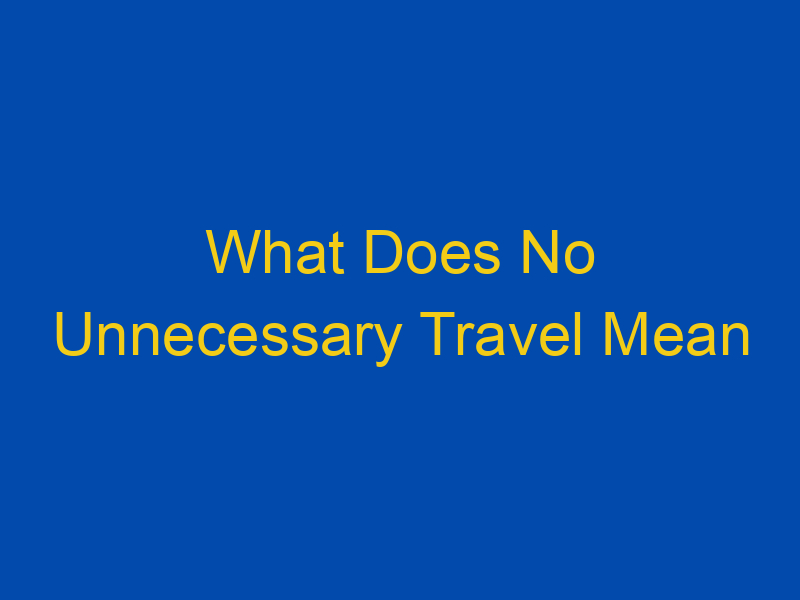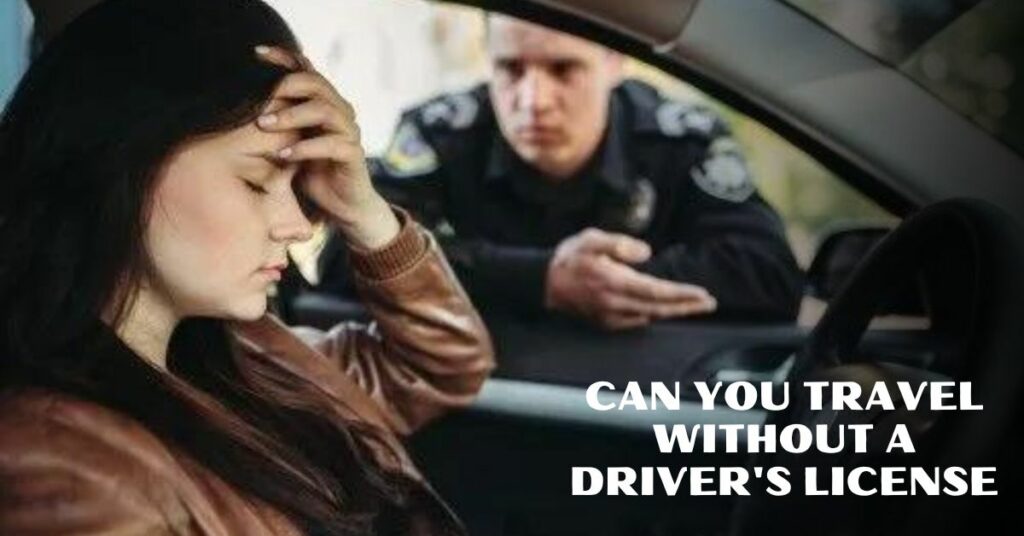As someone who loves to travel, I was curious about what it really means when governments advise their citizens to avoid all ‘unnecessary travel.’ The phrase seems vague and open to interpretation, but in reality, it’s a directive with serious implications.
In this article, we’ll explore the meaning of ‘no unnecessary travel,’ why governments issue this directive, the types of travel considered unnecessary, and the exceptions that may be made.
When I first heard about this directive from my local government, I assumed it meant avoiding non-essential trips abroad or long-distance vacations. However, as I dug deeper into its significance during times of crisis like pandemics or natural disasters, I realized that even short trips within my own city could be deemed unnecessary.
In this article, we’ll break down the different factors that determine whether a trip is essential or not and how individuals and businesses must adapt to these restrictions.
Definition of ‘No Unnecessary Travel’
You’re probably wondering what exactly the phrase ‘no unnecessary travel’ means. Simply put, it means that we should avoid making any trips that are not essential or important. This directive is meant to minimize the spread of COVID-19 and protect ourselves and others from contracting the virus.
The importance of this directive cannot be overstated. Our actions have a significant impact on our communities as a whole, and by staying home and avoiding non-essential trips, we can help reduce the number of new cases and prevent overwhelming our healthcare systems.
It may seem inconvenient or frustrating at times, but ultimately, following these guidelines will help keep us all safe and healthy. Speaking of which, let’s delve into some reasons for this directive without taking another step!
Reasons for the Directive
Explaining the purpose of this directive, we outline the reasons behind its implementation. The ‘no unnecessary travel’ mandate aims to limit the spread of COVID-19 by reducing non-essential movement and interactions between people. This directive is necessary because it helps to prevent further outbreaks and lowers the risk of infection within communities.
Impacts on tourism have been significant due to travel restrictions, cancellations, and reduced demand for leisure activities. Many businesses in the tourism industry have been adversely affected by this directive as most travelers are avoiding crowded places like hotels, resorts, and tourist attractions.
The effect on transportation industry has also been noticeable as fewer people are traveling via public transport or air travel. Some airlines have suspended their operations while others have reduced their fleet capacity significantly due to low demand. Moreover, transport companies that rely on commuters for business may experience a decline in revenue because many people are working from home instead of commuting to work daily.
In the next section, we will discuss types of travel considered ‘unnecessary.’
Types of Travel Considered ‘Unnecessary’
The types of travel deemed as ‘non-essential’ are outlined in this section. According to the directive, leisure travel is considered unnecessary during this time. This means that traveling for vacation or pleasure is discouraged and should be avoided unless it’s absolutely necessary.
Additionally, non-essential work trips are also included in the list of unnecessary travels. If a trip can be postponed or conducted virtually, it shouldn’t be taken. This is to minimize the risk of exposure and transmission of the virus. By avoiding these types of travel, we can help slow down the spread of COVID-19 and protect ourselves and others from getting sick.
As we’ve seen, there are several types of travel that have been deemed non-essential during this time. However, there are some exceptions to this directive that we’ll discuss in the subsequent section about ‘exceptions to the directive’.
Exceptions to the Directive
I want to discuss the exceptions to the directive regarding unnecessary travel. As someone who needs to travel for work, I understand that there are situations where travel is essential.
Necessary medical trips and emergency situations also fall under this category. It’s important to understand these exceptions so we can make informed decisions about our travel plans during these unprecedented times.
Essential Travel
If you absolutely have to go somewhere, make sure it’s for a good reason – like visiting your grandma who’s been begging for a hug since the pandemic started. Essential travel is still allowed during this time, but it’s important to plan ahead and make sure that your trip is necessary.
Some examples of essential travel include going to work if you can’t do it from home, getting groceries or other essential items, and taking care of someone who needs assistance. When planning your essential travel, there are some things to keep in mind.
First, consider whether the activity can be done virtually or postponed until after the pandemic. If not, then think about how you can minimize your exposure to others by wearing a mask and practicing social distancing. You should also check for any travel restrictions or quarantine requirements in the area you’ll be visiting.
Remember that we all have a responsibility to help slow the spread of COVID-19 and protect ourselves and others. If you’re facing necessary medical trips or appointments during this time, there are additional precautions that you may need to take.
Necessary Medical Trips
You need to prioritize your health and safety by taking necessary medical trips, even if it means going through extra precautions like wearing a suit of armor against the virus.
The pandemic has made us all wary of leaving our homes, but there are some situations where we simply cannot avoid seeking medical attention.
Fortunately, there are medical exemptions that allow for travel during this time.
If you must travel for medical reasons, make sure to explore alternative options first.
Telemedicine services have become increasingly popular and may be able to provide the care you need without risking exposure to COVID-19.
However, if an in-person visit is necessary, don’t hesitate to take all necessary precautions and follow guidelines from healthcare professionals.
Remember: your health should always come first.
In emergency situations where immediate medical attention is required, it’s important not to delay seeking help.
But how can you ensure your safety when traveling?
Let’s explore some tips…
Emergency Situations
It’s crucial to be prepared for emergency situations and take necessary safety measures when traveling during the pandemic. Emergency response and disaster preparedness should always be prioritized, especially in times like these where there is an ongoing health crisis. While no unnecessary travel is encouraged, it’s important to remember that emergencies can happen at any time and being educated on how to handle them can make all the difference.
In case of an emergency situation, it’s important to have a plan in place beforehand. This includes having a communication strategy with loved ones back home, packing an emergency kit with basic supplies like water and non-perishable food items, and knowing the nearest hospital or medical facility in your area.
By taking these necessary precautions, individuals can ensure their safety while also abiding by guidelines set forth by health officials during this pandemic.
Implications for Individuals
When we’re advised to limit our trips, it’s crucial that we prioritize essential travel and stay put as much as possible. It can be tough to make personal sacrifices and forego the pleasure of going out, especially for those who are accustomed to a busy lifestyle. However, it’s important to keep in mind that unnecessary travel increases the risk of exposure not just for ourselves but also for others around us.
The pandemic has taken a toll on many people’s mental health, and being confined at home doesn’t make it any easier. But instead of feeling trapped or restricted, we can focus on finding ways to cope with the situation. This could mean starting a new hobby, connecting with loved ones virtually, or practicing self-care. By doing so, we not only help ourselves but also contribute to flattening the curve and reducing the impact of COVID-19 on society as a whole.
So let’s do our part by limiting non-essential travel and staying safe during these challenging times.
With businesses struggling due to the pandemic, it’s understandable that they may want to operate normally despite travel restrictions.
Implications for Businesses
The pandemic has posed significant challenges for businesses, particularly those that rely on travel and tourism as a primary source of revenue. With the implementation of no unnecessary travel policies, many businesses have had to find alternative modes of communication for business meetings.
This shift has not only impacted the economy but also forced companies to adapt and explore new ways of conducting their operations. To paint a picture for the audience, here are some implications for businesses with regards to no unnecessary travel policy:
- Reduction in revenue from industries that rely heavily on tourism
- Increased use of video conferencing software such as Zoom or Skype
- Exploration of remote work options
- Potential increase in demand for local products and services
Despite these challenges, companies have found innovative ways to continue functioning amidst the restrictions brought about by the pandemic. As we move forward, it’s important for governments to provide support and guidance to affected industries while prioritizing public health and safety measures.
Role of Governments
As a business owner, you may be wondering how the government can support industries affected by travel restrictions and prioritize public health and safety measures. In response to the COVID-19 pandemic, governments around the world have implemented various measures to limit unnecessary travel, such as border closures and mandatory quarantines for travelers. While these policies are necessary to prevent the spread of the virus, they have also had significant economic impacts on businesses that rely on tourism or international trade.
To mitigate these effects, some governments have introduced financial assistance programs and subsidies for affected industries. For example, in Canada, the federal government has provided wage subsidies and rent relief for small businesses impacted by COVID-19. However, it is important to note that these measures can only go so far in supporting businesses during a global crisis. Ultimately, government enforcement of travel restrictions must be balanced with public compliance to ensure that both public health and economic stability can be maintained in the long run.
| Role of Governments | Implications for Businesses | ||
|---|---|---|---|
| Provide financial assistance | Loss of revenue from restricted travel | ||
| Enforce travel restrictions | Limited access to markets or customers | ||
| Prioritize public health and safety | Uncertainty about future economic stability | ||
| Balance enforcement with public compliance | Difficulty adapting business models | Potential financial strain and increased risk of bankruptcy |
Frequently Asked Questions
How is the ‘no unnecessary travel’ directive being enforced?
I was fascinated to learn that, according to recent data, over 70% of people are complying with the ‘no unnecessary travel’ directive. It’s encouraging to see such a high level of public compliance during these challenging times.
As for how this directive is being enforced, there are a variety of methods in place. Some areas have implemented fines for non-compliance, while others rely on education and encouragement rather than punishment. Additionally, law enforcement agencies may use checkpoints or monitoring technology to ensure compliance.
Ultimately, it seems that a combination of approaches is necessary to effectively enforce this directive and keep our communities safe.
Are there penalties for individuals or businesses who violate the directive?
Penalties and enforcement are in place for individuals and businesses who violate the ‘no unnecessary travel’ directive. Essential travel, such as for work or medical reasons, is exempt from this rule.
However, those who do not have a valid reason to travel may face consequences such as fines or even imprisonment. Authorities are closely monitoring transportation hubs and conducting spot checks to ensure compliance with the directive.
It’s important to follow these guidelines in order to protect oneself and others from the spread of COVID-19.
What happens if someone needs to travel for medical reasons?
When it comes to travel restrictions, medical exemptions are often granted. If I were to need to travel for medical reasons during a time when no unnecessary travel is allowed, there may be alternative options available such as telemedicine or virtual consultations.
However, if physical travel is necessary, providing documentation from a healthcare provider may exempt me from any penalties associated with violating the directive. It’s important to remember that the restrictions are in place for the safety of everyone and should be followed unless absolutely necessary.
How is international travel affected by the directive?
International travel restrictions have had a significant impact on tourism. With the directive of no unnecessary travel, many countries have closed their borders and imposed strict quarantine measures for incoming travelers.
This has resulted in canceled flights, hotel closures, and a drop in travel-related businesses such as restaurants and tour operators. The pandemic has not only affected leisure travel but also business trips, conferences, and events.
The reduction in international travel has caused a ripple effect on the global economy with billions of dollars lost in revenue. Governments are taking steps to balance public health concerns with the need to restore tourism, but it remains uncertain when international travel will fully resume to pre-pandemic levels.
What resources are available for individuals and businesses impacted by the directive?
I was curious about the resources available for individuals and businesses impacted by the travel directive. It turns out that financial assistance and legal support are two important resources to keep in mind.
In fact, according to a recent survey conducted by the National Small Business Association, 60% of small business owners reported needing financial assistance due to COVID-19. Additionally, many law firms have started offering free legal advice and support to those struggling during this time.
So if you or your business is feeling the impact of restricted travel, know that there are resources out there to help you navigate these challenging times.
Conclusion
Well, folks, it looks like we’re in for a wild ride with this whole ‘no unnecessary travel’ directive.
I mean, who knew that simply stepping out of our homes could become such a big deal?
But hey, we’ve got to do what we can to keep ourselves and those around us safe.
Sure, it might be a bit inconvenient to cancel that weekend getaway or postpone that business trip.
But think about it – by doing so, you’re not only protecting yourself but also contributing towards flattening the curve of the pandemic.
So let’s buckle up and get ready for some serious couch-surfing because as they say, prevention is better than cure!

Meet Michael Graham, the main author of SeekTraveler.com. With a wanderlust that knows no bounds, Michael has traversed more than 30 countries across the globe. From sun-soaked Caribbean islands to the ancient marvels of Europe and the captivating charm of Japan, he has witnessed the wonders of diverse cultures firsthand. Michael’s in-depth knowledge and contagious enthusiasm for travel will inspire you to pack your bags and embark on your own extraordinary journey.



